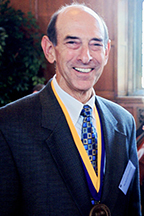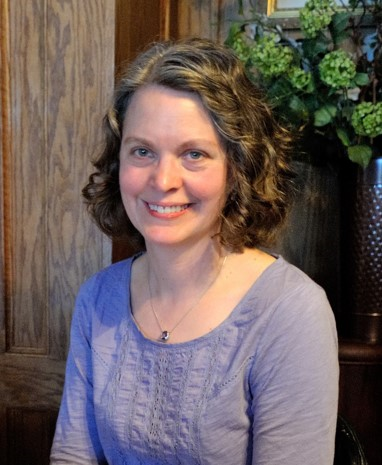Drs. Harry Gray and Richard Eisenberg, both longstanding and esteemed members of the GRC community, will be featured as keynote speakers at this free event, open to all members of the scientific community and scientists of all career stages. In addition to their scientific talks, Dr. Gray and Dr. Eisenberg will discuss the role GRCs have played in the great advances of inorganic chemistry in their careers and fields. Dr. Kara Bren, University of Rochester, will moderate the discussion.
Dr. Gray, Arnold O. Beckman Professor of Chemistry at the California Institute of Technology, Founding Director of the Beckman Institute, awardee of many prestigious honors including the National Medal of Science and the Wolf Prize in Chemistry, and former GRC Board Chair, will present a scientific talk titled, "Sixty Years of Inorganic Chemistry".
Dr. Eisenberg is the Tracy H. Harris Professor of Chemistry, Emeritus, at the University of Rochester, awardee of many prestigious honors including the Nichols Medal for contributions to Inorganic Photochemistry and the John C. Bailar, Jr. Award for Outstanding Research in Inorganic Chemistry. He was Editor-in-Chief of the ACS journal Inorganic Chemistry during 2001-2012, and Associate Editor, PNAS 2013-2020. He will present a scientific talk titled, "Inorganic Chemistry, Catalysis and Photochemistry - Tackling Big Problems the GRC Way".
Please join us for an engaging and informative presentation followed by a Q&A period with these renowned scientists. We look forward to seeing you at the frontiers of science!
About the Speakers

Harry Gray is the Arnold O. Beckman Professor of Chemistry and the Founding Director of the Beckman Institute at the California Institute of Technology. After graduate work in inorganic chemistry at Northwestern University and postdoctoral research at the University of Copenhagen, he joined the chemistry faculty at Columbia University, where in the early 1960s he developed ligand field theory to interpret the electronic structures and reactions of transition metal complexes. After moving to Caltech in 1966, he began work in inorganic photochemistry that led to the development of light absorbers and robust catalysts for the production of solar fuels. He also began research in biological inorganic chemistry, focusing on investigations of the mechanisms of metalloprotein redox reactions. In the course of this work, he and coworkers demonstrated that electrons can tunnel rapidly over long molecular distances through folded polypeptide structures. This discovery opened the way for experimental and theoretical work that shed new light on the mechanisms of electron flow through proteins that function in respiration and photosynthesis. Gray has published over 900 research papers and 18 books. He has received the Ira Remsen Award (1979); the Edgar Fahs Smith Award (1984); the Bailar Medal (1984); the Centenary Medal (1985); the National Medal of Science (1986);the Pauling Medal (1986); California Scientist of the Year (1988); the AIC Gold Medal (1990); the Waterford Award (Scripps Research Institute, 1991); the Linderstrøm-Lang Prize (Denmark, 1992); the Gibbs Medal (1992); the Basolo Medal (1994); the Chandler Medal (1999); the Harvey Prize (2000); the Nichols Medal (2003); the Wheland Medal (2003); the Dwyer Medal (Australia, 2003); the NAS Award in Chemical Sciences (2003); the Benjamin Franklin Medal in Chemistry(2004); the Wolf Prize in Chemistry (2004); the City of Florence (Italy) Prizein Molecular Sciences (2006); the Welch Award in Chemistry (2009); the International Coordination Chemistry Award (Japan, 2010); the Othmer Gold Medal(2013); the T. W. Richards Medal (2014); the MacDiarmid Medal (2017); the Cotton Medal (2018); the Westheimer Prize (2018); the Richard P. Feynman Prize(2018); seven national awards from the American Chemical Society, including the Priestley Medal (1991); and 22 honorary doctorates. Gray is a member of the National Academy of Sciences; the American Academy of Arts and Sciences; the American Philosophical Society; a foreign member of the Royal Danish Academy of Sciences and Letters; the Royal Swedish Academy of Sciences; the Royal Society of Great Britain; and the Accademia Nazionale dei Lincei. He served on the Council of the National Academy of Sciences (1986-1989) and on the Governing Board of the National Research Council (1986-1989). He was President of the Society of Biological Inorganic Chemistry (2002-2004), Chairman of the Board of Trustees of the Gordon Research Conferences (2000), and Chairman of the Board of Directors of the Arnold and Mabel Beckman Foundation (2013-2015).

Richard Eisenberg is Tracy Harris Professor Emeritus at the University of Rochester. He received his undergraduate and graduate degrees from Columbia University. His independent career commenced in 1967 at Brown University, and in 1973, he joined the faculty of the University of Rochester. He served as Chair of the UR Chemistry Department (1991-'94) and was named to the Harris Chair in 1996. Eisenberg's research interests are in inorganic and organometallic chemistry, photochemistry relating to solar energy conversion, and catalysis. Some of Eisenberg's specific research activities include the photogeneration of hydrogen from water using systems based only on more common elements, luminescent square planar complexes and their incorporation into molecular assemblies for photoinduced charge separation, parahydrogen induced polarization for hydrogen addition reactions, discovery of new luminescent gold and copper complexes for application in electroluminescent devices, and the design of new electrophilic catalysts for electrocyclizations and tandem organic transformations. Eisenberg has mentored more than eighty PhD and postdoctoral research students. Foremost among his activities in the chemistry community, Eisenberg was the Editor-in-Chief of Inorganic Chemistry and an Associate editor of the Proceedings of the National Academy of Sciences. He has served as Chair of the ACS Inorganic Division, Chair of the Organometallic Subdivision, Chair of the Gordon Research Conference on Organometallic Chemistry and as a member of the editorial advisory boards of the Journal of the American Chemical Society and Accounts of Chemical Research among others. He was the recipient of the 2003 ACS Award for Distinguished Service in the Advancement of Inorganic Chemistry and shared the 2011 ACS Nobel Laureate Signature Award in Graduate Education with his student Ping-Wu Du. In 2010, he received the Lifetime Achievement Award for Graduate Education from the University of Rochester. He was elected a Fellow of the American Association for the Advancement of Science in 2005, a Fellow of the American Academy of Arts and Sciences in 2009, and a Member of the U. S. National Academy of Sciences in 2010. Eisenberg has served on the NAS Board on Chemical Sciences and Technology.
About the Moderator

Kara Bren earned her BA in chemistry at Carleton College in 1991, and her PhD at Caltech under Harry Gray’s supervision in 1996. After a postdoc at UC Davis in the lab of Gerd La Mar, she joined the faculty at the University of Rochester in 1997. In 2008, she was promoted to the rank of Professor. At Rochester, she established a research program investigating new methods for engineering metalloproteins in the cytochrome c family and structure-function-dynamics relationships in cytochromes. More recently, she has developed cytochrome c derivatives and metallopeptide complexes as artificial hydrogenases, or enzymes that catalyze the production of hydrogen from aqueous solution. The Bren group's catalysts couple to synthetic, biomolecular, or nanoscale photosensitizers to yield assemblies to produce hydrogen as a solar fuel. In related work, the Bren group is developing catalysts for the reduction of environmental pollutants nitrite and carbon dioxide to useful products. Kara is a Fellow of the American Association for the Advancement of Science (elected 2018), a Kavli Fellow of the National Academy of Sciences (2017), and an Associate Editor for the Journal of the American Chemical Society (since 2014). She also has been a Sloan Fellow (2003-2005) and the Paul Saltman Memorial Lecturer (2004). She has served as Chair of the Bioinorganic Subdivision of the ACS Division of Inorganic Chemistry (2010) and is the Chair of the 2022 Metals in Biology Gordon Research Conference. At Rochester, Kara is the Program Director for the NIH Chemistry-Biology Interface Predoctoral Training Program.
GRC Connects is an initiative of the Gordon Research Conferences that provides opportunities for GRC communities to connect and collaborate until we resume in-person meetings, furthering GRC's commitment to find new and creative ways to advance the frontiers of science.
